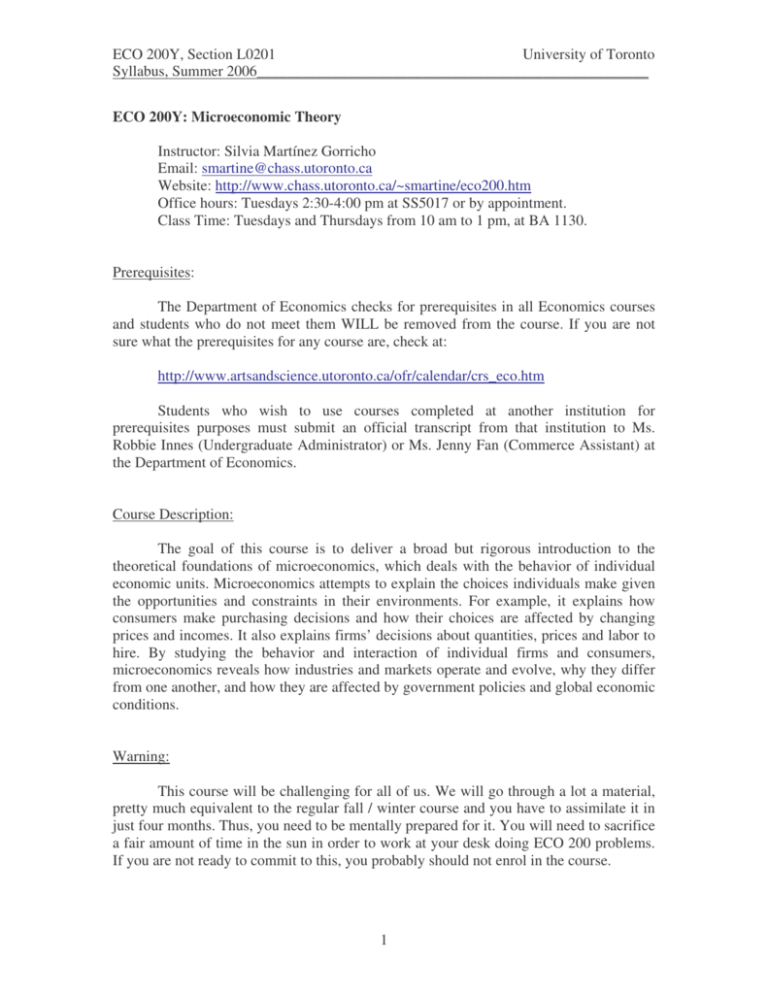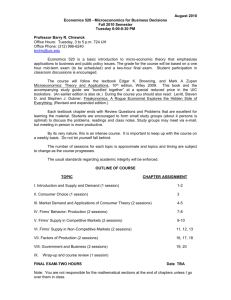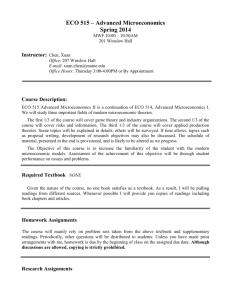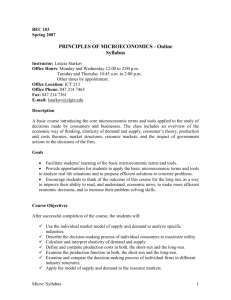
ECO 200Y, Section L0201
University of Toronto
Syllabus, Summer 2006____________________________________________________
ECO 200Y: Microeconomic Theory
Instructor: Silvia Martínez Gorricho
Email: smartine@chass.utoronto.ca
Website: http://www.chass.utoronto.ca/~smartine/eco200.htm
Office hours: Tuesdays 2:30-4:00 pm at SS5017 or by appointment.
Class Time: Tuesdays and Thursdays from 10 am to 1 pm, at BA 1130.
Prerequisites:
The Department of Economics checks for prerequisites in all Economics courses
and students who do not meet them WILL be removed from the course. If you are not
sure what the prerequisites for any course are, check at:
http://www.artsandscience.utoronto.ca/ofr/calendar/crs_eco.htm
Students who wish to use courses completed at another institution for
prerequisites purposes must submit an official transcript from that institution to Ms.
Robbie Innes (Undergraduate Administrator) or Ms. Jenny Fan (Commerce Assistant) at
the Department of Economics.
Course Description:
The goal of this course is to deliver a broad but rigorous introduction to the
theoretical foundations of microeconomics, which deals with the behavior of individual
economic units. Microeconomics attempts to explain the choices individuals make given
the opportunities and constraints in their environments. For example, it explains how
consumers make purchasing decisions and how their choices are affected by changing
prices and incomes. It also explains firms’ decisions about quantities, prices and labor to
hire. By studying the behavior and interaction of individual firms and consumers,
microeconomics reveals how industries and markets operate and evolve, why they differ
from one another, and how they are affected by government policies and global economic
conditions.
Warning:
This course will be challenging for all of us. We will go through a lot a material,
pretty much equivalent to the regular fall / winter course and you have to assimilate it in
just four months. Thus, you need to be mentally prepared for it. You will need to sacrifice
a fair amount of time in the sun in order to work at your desk doing ECO 200 problems.
If you are not ready to commit to this, you probably should not enrol in the course.
1
ECO 200Y, Section L0201
University of Toronto
Syllabus, Summer 2006____________________________________________________
Textbook:
The recommended textbook for this course is:
- E. E. Browning & M. A. Zupan, Microeconomics: Theory and Applications, 9th
Edition, 2006, John Wiley & Sons. Although the 9th edition is superior in terms of up-todate examples, you can use the 8th Edition or even the 7th Edition if you wish to do so.
This book is being used by the other instructors of the course. Another good
reference for you is:
-
Pindyck and Rubinfeld, Microeconomics, 6th Edition, Pearson Prentice Hall.
Although the content of both books is similar, I like more the structure provided
by this latter book (in my opinion, the material is better organized and it offers more
graphs). The main drawback from this book is that it does not cover important material
such as The Labor-Leisure Choice and The Intertemporal Choice. I encourage you to
check both references and buy the one you feel more comfortable with. Independently of
which textbook you choose, it is important that all of you get the Study Guide for
Microeconomics, 9th Edition, by Browning & Zupan.
Problem sets:
In order to master the material, you need to practice the concepts and techniques
and know when to apply them. It is not enough to understand what is done in class. Like
swimming or playing the violin, you don’t improve your speed or stamina while watching
others swim or play. The biggest requirement is practice! There will be assigned
questions for each topics covered. You need to test yourself by doing the questions. You
must do the exercises in order to do well on the tests and final exam. If you get them
wrong or get stuck, do not worry, you are doing what needs to be done to learn
microeconomics. The most important thing is to realize why you got them wrong, get a
fully understanding of the right solution and get them right on the final!
Although you do not need to hand the assigned questions in for grading, you are
strongly encouraged to try them out. Ideally, you team up with one or two of your
classmates to form a study group to try and discuss them. In general, I will dedicate the
last hour of each session to go over the solutions for some of these questions. You are
urged to try these problems in advance, rather than attend to copy answers.
Aid Centre:
Two teaching assistants (TAs) and myself will hold office hours every week
(times and location to be announced). TAs will also be available to answer questions by
email provided that the student shows some indication of having attempted to solve a
question before seeking clarification from e-TA. Please, check the website for further
information in this regard.
2
ECO 200Y, Section L0201
University of Toronto
Syllabus, Summer 2006____________________________________________________
Grading Scheme:
Your grade for the course will be based on two term tests ( 25% each ) an a final
exam ( 50% ). The final exam will cover the entire course material.
Policy on Illness:
If you miss a test due to an approved reason, you must submit official
documentation to the Department of Economics within one week of the missed test in
order not to be awarded a mark of zero. For example, if you missed a test due to a valid
medical reason, then you must provide a signed and detailed copy of a University of
Toronto Medical certificate stating the nature of the illness and the fact that you were too
ill to write an examination. A copy of this certificate is available from your college
registrars, health services or on the following URL:
http://www.utoronto.ca/health/forms/medcert.pdf
Students who miss one term test due to a valid and certified reason are eligible to
write a comprehensive make-up test in the last week of class based on the entire term’s
work. It is important to understand that the make-up midterm will not be given and
graded prior to the drop date. Therefore, students writing the make-up test will not be
able to drop the course without academic penalty if they do not perform well.
Appeals:
If you appeal to re-grade a test, please submit your complaint to me in written
format. I will re-grade not only the parts that you have complained, but also the other
parts that you have not. Note that this may lead to a lower overall grade.
Important Dates:
Monday, May 15th
Monday, May 22nd
Tuesday, June 13th
Monday, July 3rd
Thursday, July 13th
Sunday, July 23rd
Monday, August 7th
Friday, August 11th
August 14-18th
Classes begin
Victoria Day
Tentative date for first term test
Canada Day
Tentative date for second term test
Last day to withdraw from course without
academic penalty
Civil Holiday
Classes end
Final examination period*
3
ECO 200Y, Section L0201
University of Toronto
Syllabus, Summer 2006____________________________________________________
*
The faculty of Arts and Science selects the date for this examination. Students
must not make travel, employment or other plans which may conflict with the date
chosen for the examination in this course. Any such conflict will not be accepted as
ground for writing a deferred examination.
Course Outline:
Lecture time will not be spread evenly over the material discussed in the textbook.
Disproportionate time will be devoted to the more important or difficult ideas while ideas
that are likely to fall into place easily will not be reiterated in the lectures. Also,
occasionally, ideas that are not considered in the textbook will be discussed. Thus, the
lectures and the textbook are complements, not substitutes for each other!
This is an outline of the topics to be covered in this course. The exact dates of the
schedule are subject to revision. Check the webpage for lecture notes and suggested
problems.
1. The Basic of Supply and Demand, Chapter 2; [Ch 2].
2. Consumer Theory
Basics of Consumer Choice, Chapter 3; [Ch 3].
Individual and Market Demand, Chapter 4 (4.1-4.6); [Ch 4, 4.1-4.4].
Using Consumer Theory, Chapter 5 (sections 5.1-5.3); [x].
Intertemporal Choice, Chapter 5 (section 5.4); [x].
Labor-Leisure Choice, Chapter 17 (sections 17.1-17.2); [x].
Uncertainty and Consumer Behavior, Chapter 5 (5.6-5.7); [Ch 5, 5.1-5.3].
3. Theory of the Firm
Production, Chapter 7 (sections 7.1-7.4); [Ch 6].
Cost curves, Chapter 8 (sections 8.1-8.10); [Ch 7, 7.1-7.5].
4. Firms as Suppliers of Output
Perfect Competition, Chapter 9 and Chapter 10 (sections 10.1-10.4); [Ch
8, 9].
4
ECO 200Y, Section L0201
University of Toronto
Syllabus, Summer 2006____________________________________________________
Monopoly, Chapter 11 and Chapter 15 (sections 15.1-15.3); [Ch 10, 10.110.4].
Price Discrimination, Chapter 12; [Ch 11, 11.1-11.4].
Monopolistic Competition and Oligopoly, Chapter 13; [Ch 12].
5. Firms as Employers of Inputs
Perfect Competition, Chapter 16 (sections 16.1-16.5); [Ch 14, 14.1-14.2].
Monopoly, Chapter 16 (sections 16.6-16.7); [Ch 10, 10.5-10.6, Ch 14,
14.3-14.4].
Applications, Chapter 18 [x].
6. General Equilibrium and Efficiency, Chapters 6 and 19; [Ch 16] (if time
permits).
7. Game Theory and The Economics of Information, Chapter 14 [Ch 13, 17] (if
time permits).
Note: To assist you, the first reference for each topic is associated with the BZ
book. The chapters in brackets [ ] refer to the PB book. [x] means that the topic is not
covered in the PB book.
5






